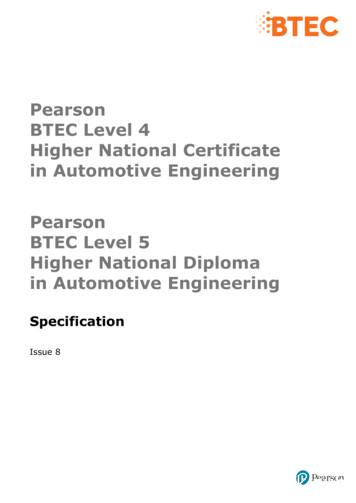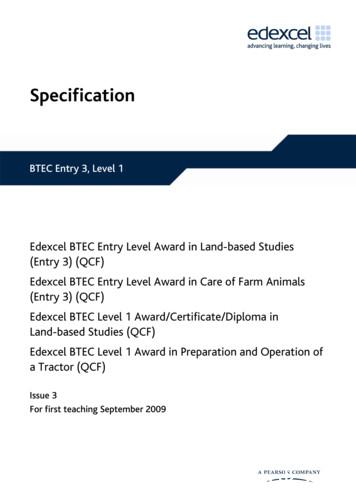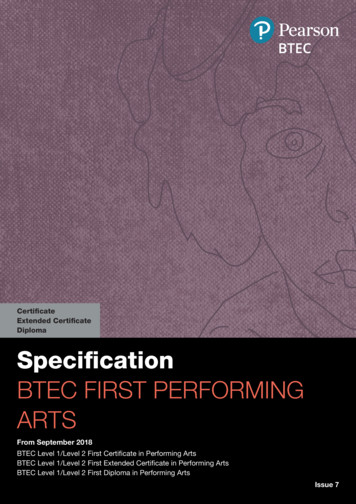BTEC LEVEL 1/2: First Award In Hospitality
BTEC LEVEL 1/2: First Award in HospitalityAssignment title:Working in the Hospitality IndustryUnitsUnit 2– Working in the Hospitality IndustryLearning aim(s)coveredLearning Aim A- Understand effective working skills in the hospitality industryLearning Aim B- Use working skills in a hospitality situationDate issuedInterim assessmentHand in dateAssessorMs. S. WintInternal verifierMs. R PerksLead Internal verifierMs. S. WintScenarioAfter a very successful work experience placement at a hotel you have been given theopportunity to make your role permanent after you have completed a 3 month trial.The hotel is just one part of a hugely successful hospitality company which owns severalbusinesses in different areas of the industry, including hotels, restaurants and bars. Themanager of the hotel was so impressed with your performance she has given you the taskof assisting her in preparing training materials for new staff in the form of a magazine stylehandbook. To do this, you will need to investigate how working skills are applied in otherhospitality industry businesses. You will then use your research to create training materialsthat new staff can use to learn about demonstrating hospitality working skills.As part of your 3 month trial, your manager also wants you to show that you are able todevelop your skills to work in different hospitality situations. She will watch you working inpractical hospitality situations where you can demonstrate appropriate hospitality workingskills, team working and verbal and non-verbal communication skills. You will then needto review and evaluate your own performance.Task 1 - (provides evidence for learning aim A)1.You are going to produce a magazine/handbook for new employees. In your magazine/handbook you mustdo the following:Choose two different types of hospitality businesses e.g. contract food service provider and a fast foodrestaurant/hotel. You are to choose three job roles within these two businesses.For each job role you must describe how important it is to have effective working skills in the hospitality industryincluding the following; Occupational skills e.g. cooking skillsPersonal skills e.g. honestyTeam working skills e.g. support of othersInterpersonal skills e.g. courtesyCommunication skills( 2A.P1)1.In your handbook/magazine you are to produce a section for new employees to inform them of how crucialit is to have the right skills. You must explain the importance of these skills in relation to the two businesses youare looking at. You must explain how important these skills are to the customers and to the individual teammembers and what the benefits are.(2A.M1)2.You are to look at the two businesses and within your magazine you are to evaluate the consequence ofpoor working skills within the two businesses. In your magazine include the effect on its staff and customers.(2A.D1)
3.In your handbook/magazine you must explain how professional policies, procedures and legislation in thehospitality industry help to provide a consistent and reliable service. (2A.P2)4.You will research into the legislations that a hospitality business must follow and explain how having policieson this legislation can impact and benefit the business. (2A.M2)Evidence you must produce for this taskMagazine/handbookCriteria covered by this task:To achieve the criteria you must show that you are able to:Describe, using examples from two different hospitality businesses, the importance of thebusinesses , customers and staff of having effective working skills in the hospitalityindustry.Explain how business and professional policies and procedures, and legislation andregulatory requirements contribute to consistent and reliable service provision in thehospitality , using examples from two contrasting hospitality businesses, the benefits for thebusiness, its customers and staff of having appropriate working skills.22A.M1Explain the impact of following business and professional policies and procedures, andlegislative and regulatory requirements affecting service provision on a selectedhospitality business22A.M2Evaluate the consequences of poor working skills on a selected hospitality business,including the effect on its staff and customers.22A.D1TextbooksSources ofFoskett D , Paskins P, Rippington N and Ceserani V – (2011) The Theory of Hospitality andCatering, Hodder education Publication, 9781444123760InformationjournalCaterer and Hotelkeeper- Reed Business PublicationsWebsiteswww.bha.org.uk -British Hospitality Associationwww.catersource.com - Education, products and news for catererswww.connexionsdirect.com – information and advice for young peoplewww.caterersearch.com- HospitalityNewsww.instituteofhospitality.org- Institute of Hospitality Professional body for hospitality,leisure and tourism industriesResourcesSpeaker from industryClassroom notesIf you have not achieved the Level 2 criteria, your work will be assessed to determine if the following Level 1criteria have been met.UnitCriterionreferenceIdentify working skills needed to work effectively in the hospitality using examples fromtwo different businesses21A.1Describe business procedures, legislation and regulatory requirements that contribute toconsistent and reliable service provision in the hospitality industry21A.2To achieve the criteria you must show that you are able to:Task 2: Provides evidence for learning aim BAs part of your 3 month trial, your manager also wants you to show that you are able to develop your skills to work in
different hospitality situations. She will watch you working in practical hospitality situations where you candemonstrate appropriate hospitality working skills, team working and verbal and non-verbal communication skills.You will then need to review and evaluate your own performance. Use these activities to evaluate your owneffectiveness in addressing a hospitality problem, and explain any areas for improvement.1.Produce a table for your training handbook that explains the different team working skills that are importantwhen working in hospitality. Include an example of each type of skill, the importance of each and its benefitsfor the customer, employer and yourself. (2B.P4)You must be observed working in two practical hospitality situations where you can demonstrate appropriatehospitality working skills, team working and verbal and non-verbal communication skills to meet businessrequirements. One of these practical situations has to involve you dealing with a customer. The other can bein a food production situation.On both occasions you will be observed on your; 2.Personal hygiene, including a fresh appearance, clean hands, short fingernails, covering of wounds.Personal appearance, including clean uniform, tidy hair, no jewelleryTeam working skills, including attitude to work, cooperation, help and assistance, fairness and considerationYour communication skills, including verbal and non-verbal(2B.P3 2B.P5)As part of your evidence, you must also record in the form of a Log, statement diary or diary entry of how youdemonstrated effective verbal/none verbal communication skills. (2B.P5)*Effective complaint handling is an important skill that you must learn in order to work effectively and solveproblems in the hospitality workplace. Customers often have high expectations of the products and servicesthey purchase and can be disappointed if your service does not live up to these expectations, resulting incomplaints.You will play the part of a receptionist in a hotel, and you receive a phone call from an angry guest sayingthere shower is not working.3.Workings in pairs prepare a script of how you will deal with the complaint, you will role-play this, it will videoedand your tutor will give you detailed feedback on your performance including an observation record.(2B.M3)4.Produce an evaluation of your own working skills from the two practical tasks you have undertaken. Justifyareas that you believe are strength in your working skills and identify any areas that you could improve andexplain how you plan to improve this in the future. (2B.D3)Evidence you must produce for this task: Observation/witness testimonies detailing how you demonstrated hospitality working, teamwork andcommunication skills in two different situations.* Log/statement/diary entry of how you demonstrated effective verbal/none verbal communication skillsYour table of team working skills.Complaint case study notes, video and tutor feedback with an observation record.Your written evaluation.Criteria covered by this task:UnitCriterionreferenceDemonstrate working skills in two hospitality situations to meet given business requirements.22B.P3Explain which team working skills in the hospitality industry and why they are important for aworkplace.22B.P4Use effective verbal and non-verbal communication skills when working in a team in twocontrasting hospitality situations.22B.P5Apply communication and team working skills in addressing a work-related problem in ahospitality situation.22B.M3To achieve the criteria you must show that you are able to:
Evaluate the effectiveness of own communication and team working skills in addressing awork-related problem in a hospitality situation, justifying areas for improvement.22B.D2TextbooksHolmes, S., Mead, T., Jackson, E. and Morgan, K. (2013) BTEC First in Hospitality, Harlow:Pearson Education 978 1 446909 06 4JournalsCaterer and Hotelkeeper (Reed Business Publications)Sources ofInformationWebsiteswww.bha.org.ukBritish Hospitality Associationwww.thecaterer.comHospitality newswww.catersource.com/CatersourceEducation, products and news for tInformation and advice for young peoplewww.instituteofhospitality.org/Institute of Hospitality – professional body for hospitality, leisure and tourism industrieswww.people1st.co.ukPeople 1st – Sector Skills Council for Hospitality, Leisure, Travel and Tourismwww.visitbritain.comVisit Britain – Official UK Travel and Accommodation GuideResources:Classroom notesNote to Assessors:Please find above some examples of textbooks. Further useful resources may be found spx.
If you have not achieved the Level 2 criteria, your work will be assessed to determine if the following Level 1criteria have been met.To achieve the criteria you must show that you are able to:UnitCriterion referenceDemonstrate working skills in one hospitality situation.21B.3Identify teamwork skills that are important to work in one hospitality situation,giving an example of each type of skill.21B.4Demonstrate the use of verbal and non-verbal communication skills in a team inone hospitality situation.21B.5
BTEC LEVEL 1/2: First Award in Hospitality Assignment title: Working in the Hospitality Industry . You are to look at the two businesses and within your magazine you are to evaluate the consequence of poor working skills within the two businesses. In your magazine include the effect on its staff and customers. (2A.D1) 3. In your handbook/magazine you must explain how professional policies .
Pearson BTEC Level 4 HNC The Pearson BTEC Level 4 HNC in Business is a qualification with a minimum of 120 credits of which 60 are mandatory core. The Pearson BTEC Level 4 HNC programme must contain a minimum of 65 credits at level 4. Pearson BTEC Level 5 HND The Pearson BTEC Lev
BTEC Level 4 HNC The Pearson BTEC Level 4 HNC in Business (QCF) is a qualification with a minimum of 120 credits of which 60 are mandatory core. The BTEC Level 4 HNC programme must contain a minimum of 65 credits at level 4. BTEC Level 5 HND The Pearson BTEC Level 5 HND in Business (QCF) is a qualification with a
BTEC Entry Level (E1, E2, E3) BTEC Level 1 (QCF) expectations for your centre. PSD, Workskills (Level 1 & 2) Life Skills years).BTEC Specialist (Level 1-3)* BTEC Professional (Level 4-7)* BTEC qualification Internal ungraded unit (‘Pass/fail’) We reviewed the information you submitted to us (actual unit grades and CAG) against our
Technology Pearson BTEC Level 3 National Foundation Diploma in Information Technology First teaching 2016 Pearson BTEC Level 3 National Diploma (2017) in Information Technology Pearson BTEC Level 3 National Extended Diploma (2017) in Information Technology First teaching 2017 . Edexcel, BTEC and LCCI qualifications Edexcel, BTEC and LCCI qualifications are awarded by Pearson, the UK’s .
Pearson BTEC Level 4 HNC Diploma in Automotive Engineering Pearson BTEC Level 5 HND Diploma in Automotive Engineering The BTEC HNCs (Higher National Certificates) are now at level 4 and are a minimum of 120 credits in size. They have been nested within the structures of the BTEC HNDs (Higher National Diplomas). BTEC HNDs are level 5 qualifications.
Qualification sizes for BTEC Firsts in the Business sector 6 3 Pearson BTEC Level 1/Level 2 First Diploma in Business 9 Rationale for the Pearson BTEC Level 1/Level 2 First Diploma in Business 9 4 Qualification structure 14 Qualification structure of the Pearson BTEC Level 1/Level 2 First Diplom
Edexcel BTEC Entry Level Award in Care of Farm Animals (Entry 3) (QCF) Edexcel BTEC Level 1 Award/Certificate/Diploma in Land-based Studies (QCF) Edexcel BTEC Level 1 Award in Preparation and Operation of a Tractor (QCF) Issue 3 For first teaching September 2009 BTEC Entry 3, Level 1
Performing Arts 35 Qualification structure of the Pearson BTEC Level 1/Level 2 First Diploma in Performing Arts (Acting) 37 Qualification structure of the Pearson BTEC Level 1/Level 2 First Diploma in Performing Arts (Dance) 39 Qualification structure of the Pearson BTEC Level 1/Level 2 First Diploma in Performing Arts (Production) 41





















